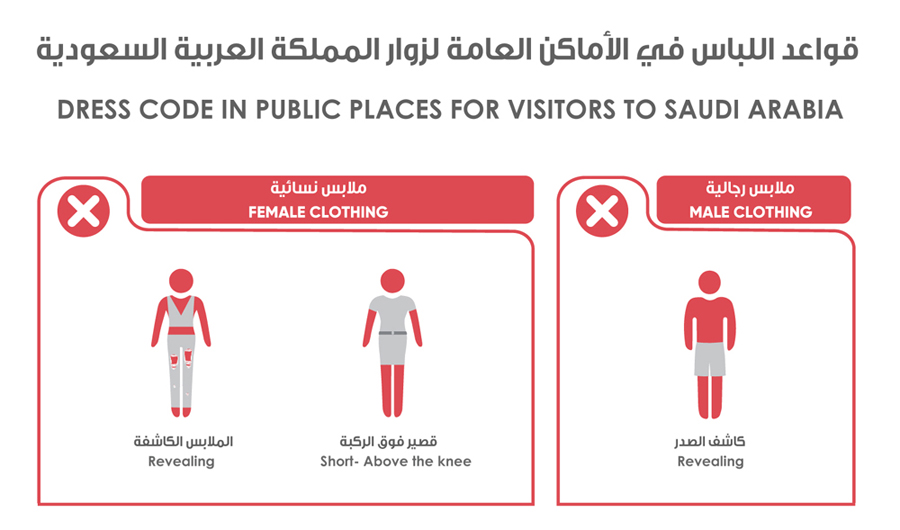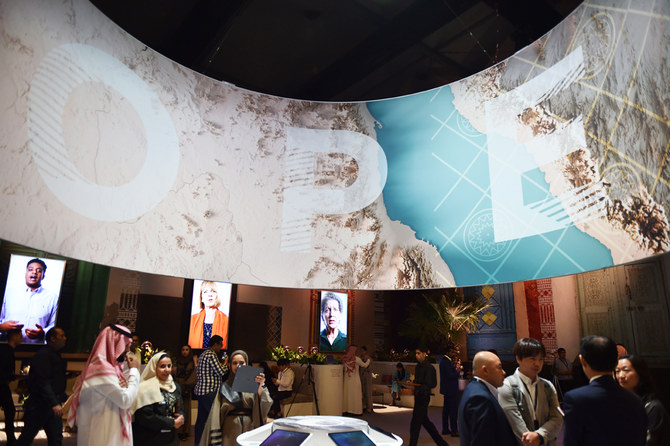JEDDAH: Saudi Arabia has given the go-ahead to implement new regulations related to public decency as the country opens up to foreign tourists.
Interior Minister Prince Abdul Aziz bin Saud bin Naif on Friday approved the rules, which identify 19 offenses as punishable.
The ministerial decision accompanies the launch of a visa regime that allows holidaymakers from 49 countries to visit Saudi Arabia. Until now, most visitors to the Kingdom have been either pilgrims or businesspeople.
Men and women are required to dress modestly, refrain from public displays of affection, and avoid using profane language or gestures.
Women are required to cover shoulders and knees in public, but they are free to choose a modest choice of clothing.

Illustration courtesy of visa.visitsaudi.com
The Kingdom is encouraging tourists and visitors to familiarize themselves with public decency laws in order to avoid fines.
Violations listed on the new visa website include littering, spitting, queue jumping, taking photographs and videos of people without permission, and playing music at prayer times.
Fines range from SR50 ($13) to SR6,000.
“The regulations are meant to ensure that visitors and tourists in the Kingdom are aware of the law relating to public behavior so that they comply with it,” said a government media statement, adding that Saudi police had the sole responsibility for monitoring offenses and imposing fines.
The sale, purchase and consumption of alcohol are illegal in Saudi Arabia, as is bringing alcohol or drugs into the country.
The new code forbids hate, racism, discrimination and indecent behavior. Anyone found engaging in indecent behavior, which includes acts of a sexual nature, will receive a SR3,000 fine that can be doubled if the violation is committed a second time.
The charter forbids playing loud music in a residential area without a prior license. The violator will receive a SR500 penalty that could be doubled if repeated.
The same punishment will be imposed on anyone caught littering streets and public places, jumping over or going around barriers to access a public place, or wearing clothing with language, images or symbols that promote discrimination, racism, porn or drug use.
A person who plays loud music at prayer times will receive a SR1,000 fine. Repeating the violation exposes the offender to a SR2,000 penalty.
Saudi Arabia has traditionally given high priority to attention and respect for the elderly and those with special needs.
As such, the new code says anyone who occupies their seats and facilities will receive a SR200 fine for the first time. The fine can be doubled if the violation is repeated.
The new code imposes a SR100 fine on people who fail to remove the excrement of their pets. The fine can be doubled if the violation is repeated.
The same punishment can apply to other violations such as writing or drawing on public transportation vehicles or public walls; lighting fires in public places; harming or frightening anyone in a public place, whether verbally or physically; and directing harmful lights, such as laser beams, at someone.
The new code includes a SR1,000 fine for those who take photos or videos of people without their permission.
The fine, which may be increased to SR2,000, applies to taking photos or videos of traffic accidents, crimes and other similar incidents.
Unless allowed, those who do not respect their turn in a line of people waiting to be served will be fined SR50. That amount can be doubled if the law is broken a second time.
The new code says no penalties can be imposed on any behavior not mentioned in the charter. It adds that violators will have to bear the costs of rectifying their violation.
Anyone harmed by a violation can claim their private rights and file a lawsuit against the offender.
In case of multiple offenders in a single violation, the prescribed fine shall be imposed separately on each violator.
Any person on whom a penalty is imposed has the right to file a complaint before the Public Decency Circuit at the Specialized Court (Board of Grievances).


























